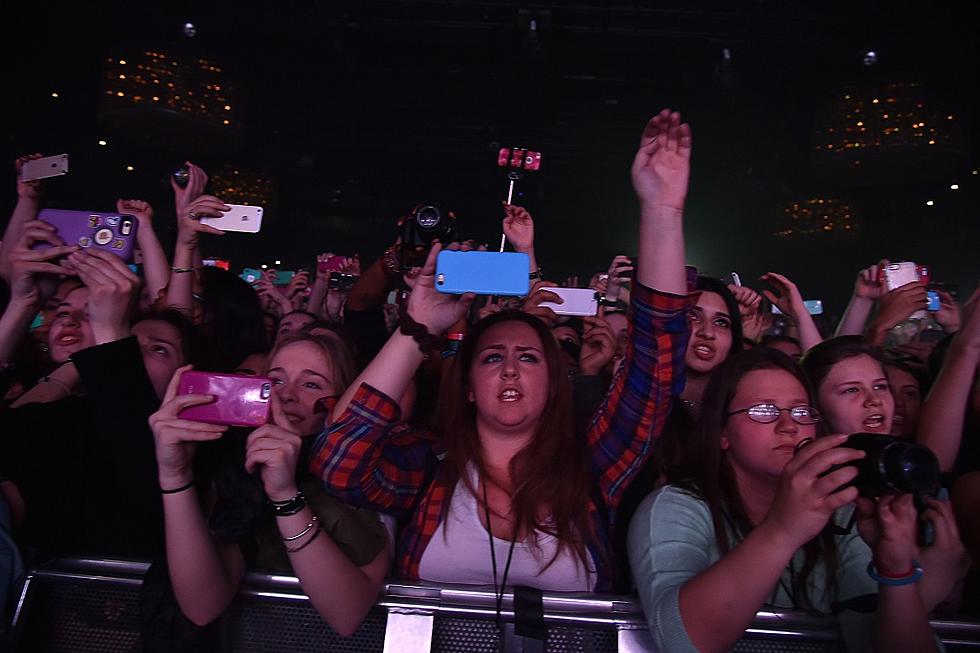
Counterpoint: Put Your Phone Away for the Concert and Live a Little (Offline)
On May 8, Taylor Swift began her Reputation Tour. By May 9 -- really, by the time the show was over -- fans could learn everything they wanted to know about the tour via social media, YouTube and the internet in general. Concertgoers shared the experience in real time, and media outlets extensively broke down what fans saw that night and what they could expect at future shows. If you searched enough, you could basically watch Swift's entire set from beginning to end from the comfort of your home.
I'll admit it: I was one of those people scouring for details. I've got tickets to one of Swift's shows in a few months, and I wanted to know if my favorite songs from her new album would be in her set. But after watching half a dozen YouTube clips, I realized something: I was completely ruining the experience I'll be having when I actually get to see her tour.
Watching smartphone-captured concert footage online is a bit like reading spoilers for a TV show: You'll be in the know ... but you've taken all of the surprise out of actually seeing it for yourself.
It's great that fans with phones have provided us with footage of once-in-a-lifetime moments; some of The Boot's most popular stories have come thanks to those videos. And, yes, those social media posts and online recaps give fans who can't see a show the chance to still experience it. But the rest of the time, it's a bit like reading spoilers for a TV show: You'll be in the know ... but you've taken all of the surprise out of actually seeing it for yourself.
Unfortunately, smartphones have created an expectation that if you're at a show, you'll be documenting it. Fans can give their friends who aren't there FOMO; media outlets can use the footage to show their followers a little something extra; and everyone's hoping they'll get a truly epic photo or capture a totally incredible moment. Besides, if you go to a concert and don't post something on your socials, were you even there?
The truth, though, is that most of those photos and videos are ... well, they're crap. The sound is distorted, and unless you're super-close to the stage, the artist is a little speck. Nothing you're capturing is quite like what you'd be seeing in front of you if you'd just put the damn phone away!
"If your phone is that important to you that you can’t live without it for two hours then I don’t know. Maybe it’s time to see a therapist." -- Jack White
Plenty of artists have admitted that they're not too fond of looking out into a crowd and seeing a sea of smartphones. Sheryl Crow has urged fans to put their phones away during concerts, and Kip Moore often makes a point of (lovingly) messing with concertgoers who are on their phones. Most recently, Jack White made headlines when he announced that, at shows on his 2018 tour, fans need to leave their phones at home, or they'll be forced to surrender them at the door. “We think you’ll enjoy looking up from your gadgets for a little while and experience music and our shared love of it IN PERSON," White explains of the decision.
True, it's a bit jarring to enact a no-phones mandate rather than to let fans simply decide for themselves, but if that's your end goal, it's necessary. It's unlikely, in today's always-connected society, that many would oblige if not required to do so.
"I want people to live in the moment, and it’s funny that the easiest way to rebel is to tell people to turn off their phone," White adds. "If your phone is that important to you that you can’t live without it for two hours then I don’t know. Maybe it’s time to see a therapist."
We don't always like being told that something is mandatory, but sometimes it's good for us.
The Boot and Taste of Country’s collaborative Point / Counterpoint series features staff members from the two sites debating topics of interest within country music once per month. Check back on July 20 for another installment.
8 of Country Music's Best Concert Traditions
More From TheBoot









